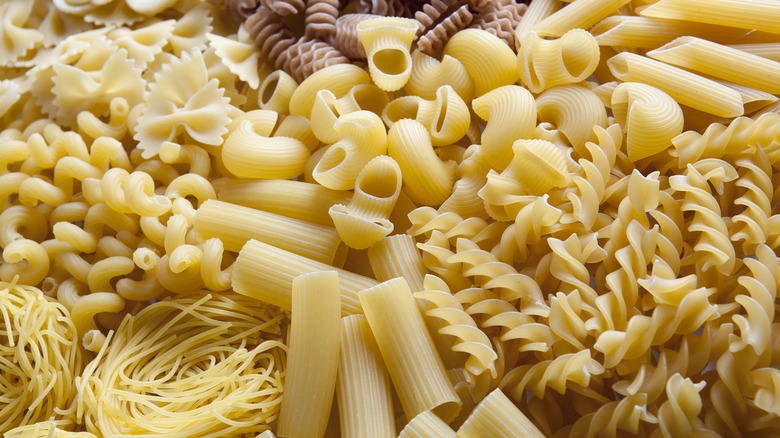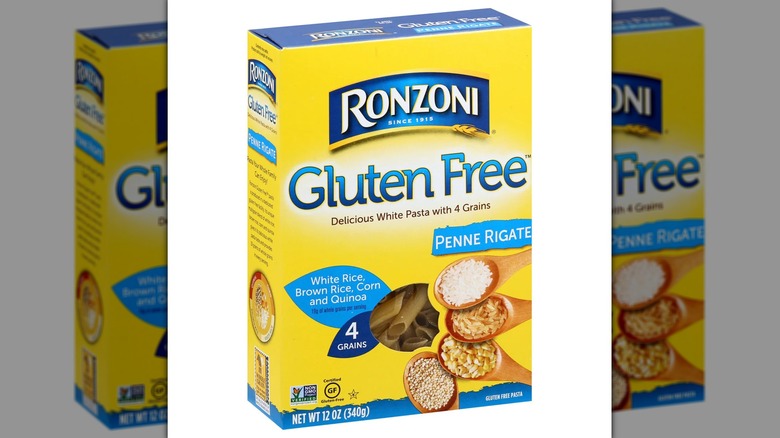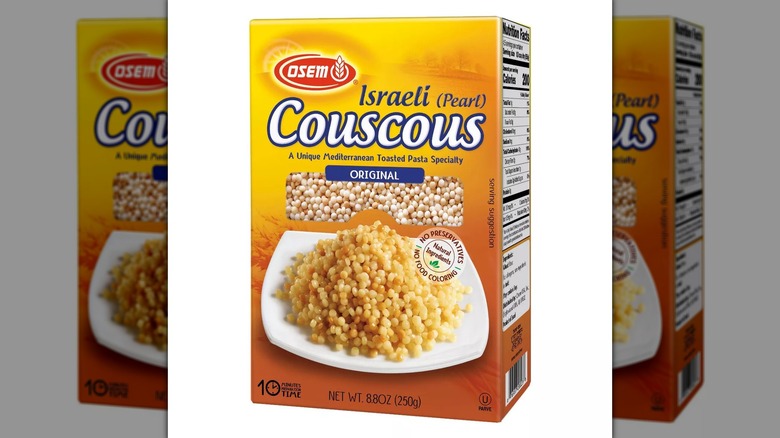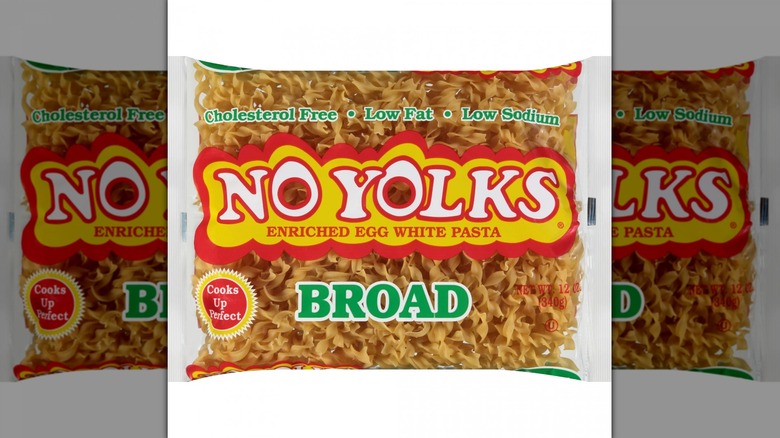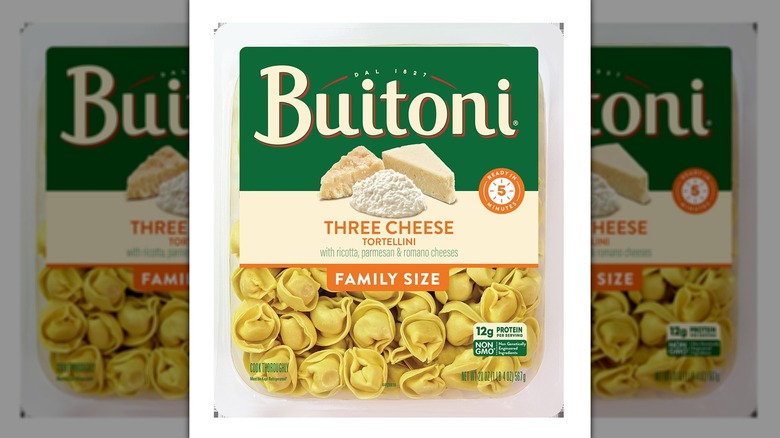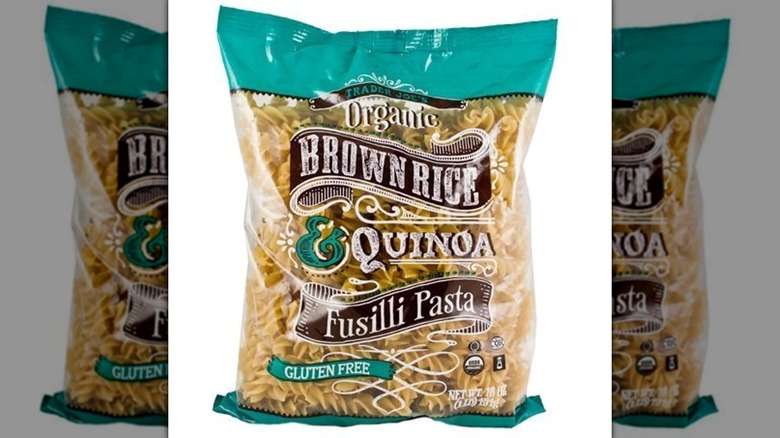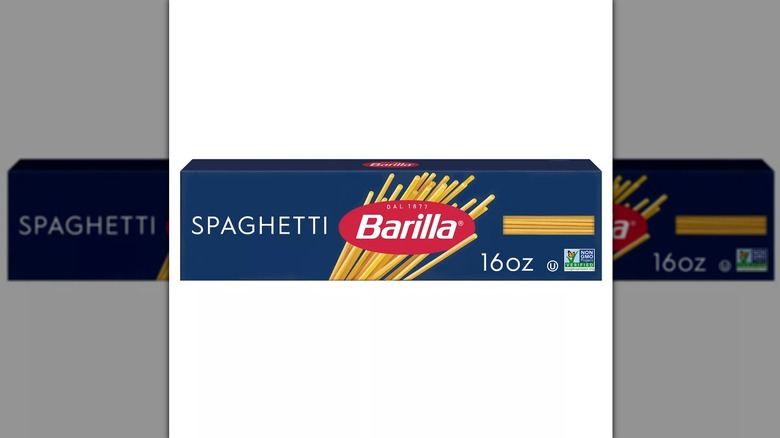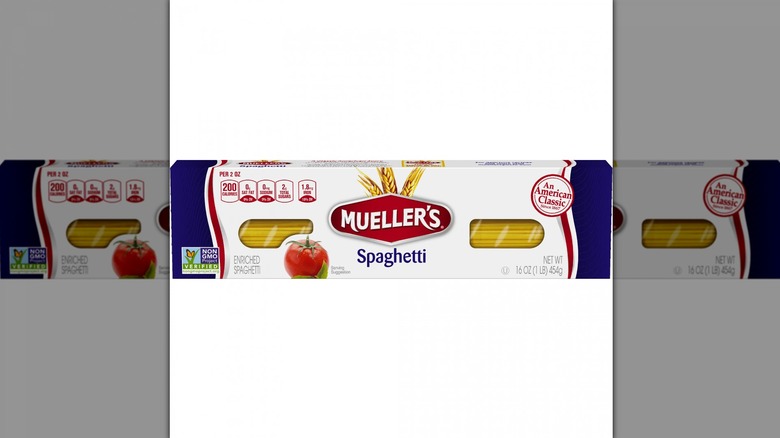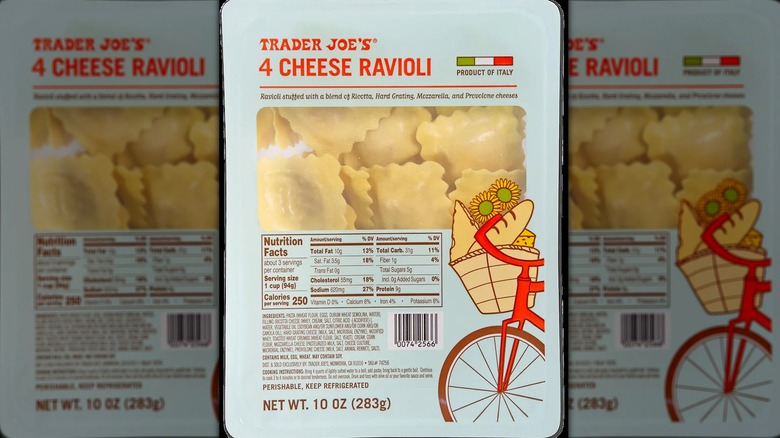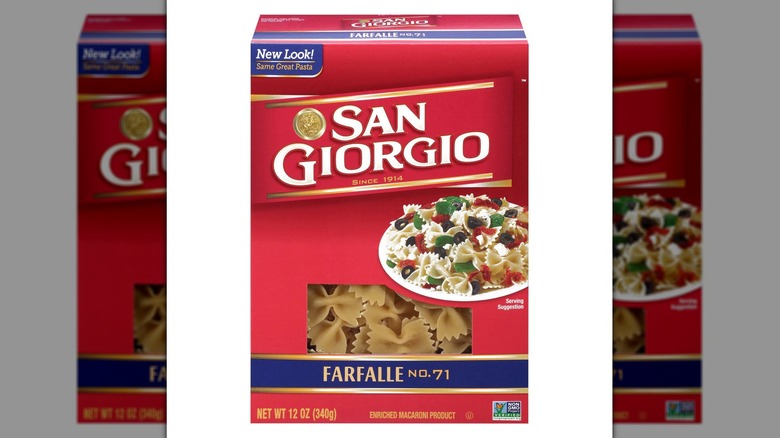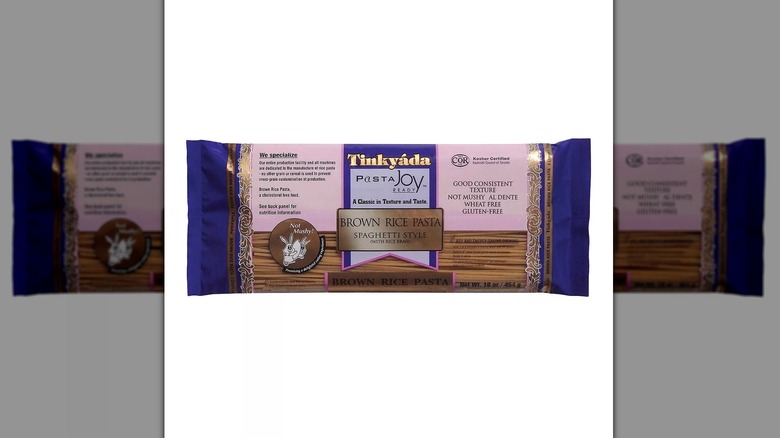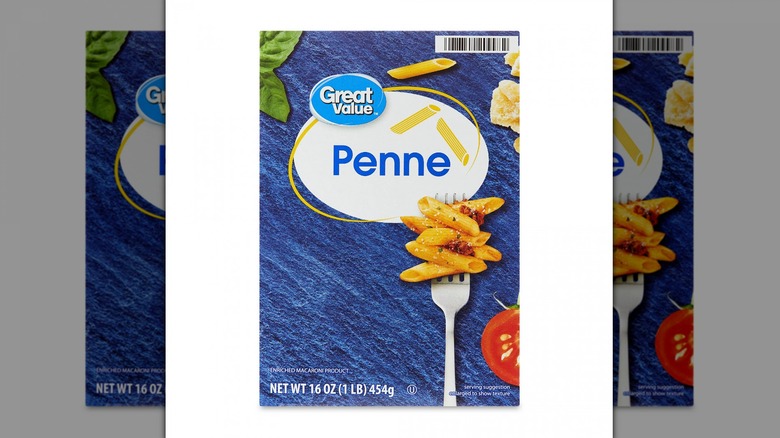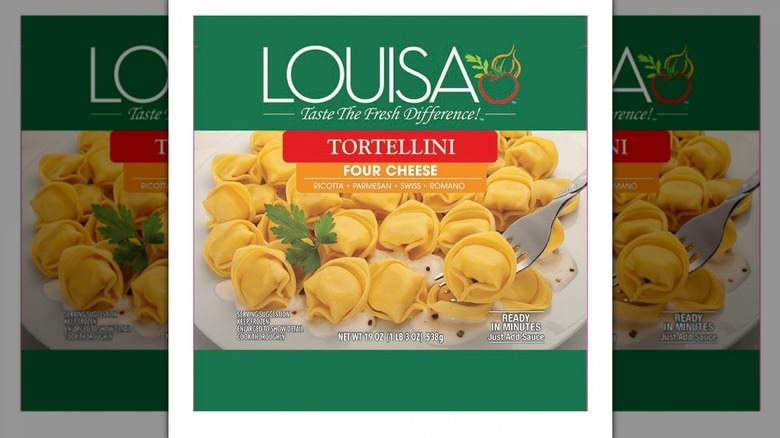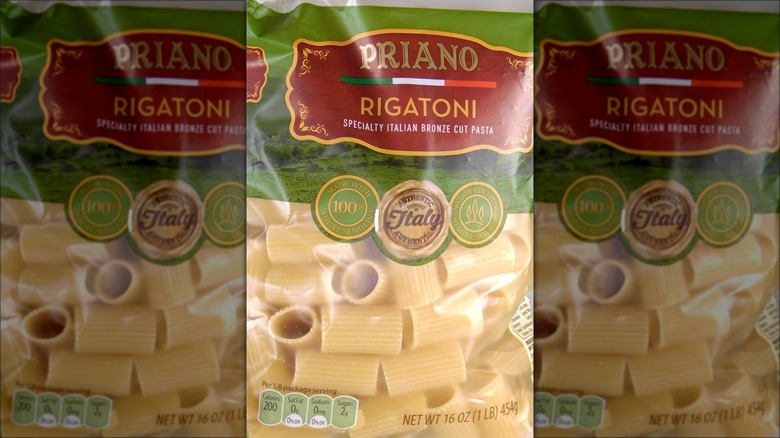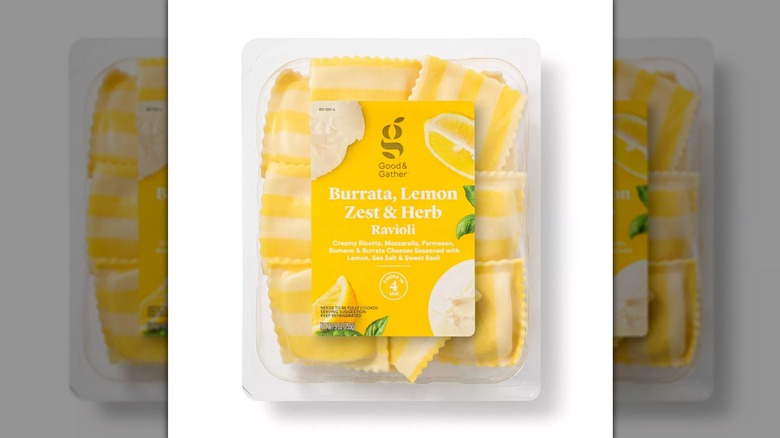15 Of The Unhealthiest Store-Bought Pastas
Pasta might not have a reputation for being the healthiest food around, but as it turns out, this favored comfort food isn't entirely unhealthy. According to WebMD, plain pasta is filling as well as low in sodium and fat. What's more, whole-grain varieties make for an excellent source of fiber and protein, according to Healthline. Plus, some companies even offer products enriched with essential nutrients and vitamins.
That being said, regular pasta is still high in carbohydrates and typically isn't gluten-free unless specified. Including too many carbs in your diet doesn't just lead to unwanted weight gain; according to an article published by Harvard's T.H. Chan School of Public Health, overloading on carbs can have a detrimental effect on the body's blood sugar levels.
Not all pasta is equally nutritious. But how exactly can you determine whether a particular pasta product is healthy or not? What kind of nutritional stats should you be on the lookout for? And, perhaps more importantly, which ones should you avoid? Before you start boiling your water, be sure to take a look at our list of 15 of the unhealthiest pastas.
1. Buitoni Chicken Parmesan Ravioli
When it comes to easy weeknight meals, it's hard to beat simply throwing together some fresh, or even frozen, pasta with your sauce of choice. Italian food giant Buitoni makes that even easier with its delicious offerings and easy-to-follow recipes. However, for those hoping to follow a healthier diet while still enjoying the occasional hearty bowl of pasta, you might want to look closely at the nutritional information for some of Buitoni's products.
Buitoni's Chicken Parmesan Ravioli combines all the elements of its namesake dish — seasoned chicken, tomato sauce, and melty mozzarella — into a single bite that can be table-ready in a matter of minutes. Unfortunately, easy doesn't translate to healthy in this case.
Every 1-cup serving of ravioli includes 36 grams of carbs, 61 milligrams of cholesterol, and a whopping 680 milligrams of sodium. Granted, that serving also delivers 15 grams of protein, but it hardly makes up for the negative health stats. On top of that, Buitoni's parent company, Nestlé, is still contending with the fallout of an E. coli outbreak stemming from Buitoni pizza products, which doesn't make the brand seem any less unhealthy.
2. Ronzoni Gluten Free Penne Rigate
Just because pasta is traditionally made from wheat doesn't mean those following a gluten-free diet can't enjoy a heaping plate of their favorite noodle shapes. Gluten-free pasta varieties abound wherever you prefer to pick up your groceries. One in particular is Ronzoni's Gluten Free Penne Rigate, which notably boasts that it is made from four different grains: white rice, brown rice, corn, and quinoa. But think twice before you get started on that penne alla vodka!
Ronzoni's Gluten Free Penne Rigate delivers 44 grams of carbs alongside just a measly 2 grams of fiber and 4 grams of protein per serving. For a pasta that so proudly advertises its grain content, you could reasonably expect to find a considerably higher amount of fiber in this product. As it is, a single serving of Ronzoni's penne is unlikely to leave you feeling full for very long, as fiber helps to do, according to MayoClinic. Plus, the carbs aren't going to do your blood sugar levels many favors, either.
3. Osem Original Israeli Pearl Couscous
In case you didn't already know, couscous, a staple grain of Middle Eastern cuisine, is a type of pasta! Its health benefits are many and various. According to Healthline, couscous is a major source of the mineral selenium, which can help your body repair damaged cells, decrease inflammation, and even promote thyroid health. On the other hand, being a carbohydrate-filled pasta, couscous can significantly increase blood sugar levels.
Osem's Kosher Israeli Pearl Couscous doesn't explicitly claim to be especially healthy, though it does advertise itself as both low sodium and low fat. Indeed, the product features zero grams of sodium and only a single gram of fat. However, those stats stand next to a significant 39 grams of carbs and only 2 grams of fiber. While choosing Osem's product may not be the worst health decision you could make, there are too many other options on the market that feature higher fiber content and even enrichment from other vitamins and minerals.
4. No Yolks Broad Noodles
While carbs aren't necessarily unhealthy in and of themselves, healthy foods that also happen to be high in carbohydrates — such as whole grain pasta – tend to balance out their nutritional offerings with a higher fiber, protein, or vitamin content. Thus, there are several factors to take into consideration when determining whether a particular pasta product is healthy or not.
You'll probably recognize No Yolks' Broad Noodles from the chicken noodle soup your mom used to make for you as a kid. Made using only egg whites — no yolks, it's in the name — the brand's Broad Noodles do contain a respectable amount of protein (8 grams per serving) alongside 125 milligrams of potassium. However, their carbs-to-fiber ratio (40 grams of carbs and 2 grams of fiber per serving) is nothing short of average, at best. This is one of the less healthy pasta options out there.
5. Buitoni Three Cheese Tortellini
There's almost no end to the number of easy, delicious dishes that can be made using simple cheese tortellini. Buitoni's version of the classic stuffed pasta comes filled with a blend of creamy ricotta, Parmesan, and Romano cheeses. As the package boasts, it can be ready in as little as five minutes and includes 12 grams of protein per serving. But a look at the product's nutrition facts will reveal some startling numbers.
Each 1-cup serving of Buitoni's Three Cheese Tortellini contains 8 grams of fat, 40 milligrams of cholesterol, a significant 450 milligrams of sodium, and 45 grams of carbs, placing this product firmly outside the realm of what could be considered healthy. And with no added vitamins and an insignificant 3 grams of fiber per serving, there really isn't much in this particular tortellini that could even help to balance out those negative numbers.
6. Trader Joe's Organic Brown Rice & Quinoa Fusilli Pasta
There are endless reasons to love Trader Joe's, from the unique products to the affordable pricing. Among some of its most delicious offerings is a vast array of pastas, both dried and fresh, in pretty much any shape you could want. And while Trader Joe's does carry more than its fair share of healthy products, not all of its pastas fit the bill.
At first glance, one could be forgiven for simply assuming that Trader Joe's Organic Brown Rice and Quinoa Fusilli Pasta is healthy. After all, it's organic and gluten-free. But a closer examination of the product's nutrition facts reveals the disappointing truth: it's utterly lacking in vitamin enrichment and features no more than the standard 2 grams of fiber in each serving. There are just too many whole wheat alternatives on the market that feature higher fiber, protein, and vitamin content for this to be considered a healthy option.
7. Barilla Spaghetti
Is there anything more comfortingly Italian than a heaping plate of spaghetti pomodoro or even spaghetti Bolognese? It's easy to see why the long, thin pasta shape is so popular — it's quick and easy to prepare, and it pairs well with just about any sauce you can whip up or buy in-store. But as we've already come to see, not all pasta counts towards a healthy meal, and it's no different with this particular variety.
For Barilla's Spaghetti, it's not so much what's in the pasta that makes it unhealthy as what's not in the pasta. The brand's take on the classic noodle features little to no added vitamin enrichment and offers only a small 3-gram portion of fiber per serving. The pasta does contain a slightly higher-than-average amount of protein, at 7 grams per serving, but again, there are just too many healthier options that come with a greater amount of vitamins, minerals, and fiber. By comparison, this pasta is not as nutritious.
8. Mueller's Spaghetti
Another classic pasta brand you probably recognize from your local grocery store is Mueller's. The company offers a variety of different pasta shapes as well as whole grain and gluten-free varieties. The brand's spaghetti can easily stand up against competitors as far as taste is concerned. But that doesn't necessarily mean that it should be your go-to choice, as far as healthy pastas go.
When it comes to health stats, Mueller's is unfortunately quite underwhelming, lacking the vitamin enrichment, fiber, and protein of some of its competitors. It offers no more than the baseline 2 grams of fibers that most such pastas contain.
If you're looking to add a healthier kick to your meal, consider opting for one of Mueller's whole grain pastas or even another brand with better nutrition facts. That being said, Mueller's spaghetti doesn't exactly claim to be the healthiest on the market, and with so many competitors, you can't blame spaghetti for being a little basic.
9. Trader Joe's 4 Cheese Ravioli
We can all agree that Trader Joe's is a place full of unique, scrumptious products — some of which can't be found in any other stores. That being said, Trader Joe's isn't exactly a health food store — something that can be seen in quite a few of the products that it markets and carries.
Take Trader Joe's 4 Cheese Ravioli, for instance. If you've ever tasted any of Trader Joe's fresh pastas, you know that this product will absolutely deliver when it comes to taste. However, for those of us trying to be just a little more health-conscious, the classic ravioli might not be the wisest option. Each 1-cup serving of the retailer's 4 Cheese Ravioli includes 10 grams of fat, 55 milligrams of cholesterol, 31 grams of carbs, and an outrageous 620 milligrams of sodium. Add to that a single gram of fiber per serving, and there's no way this pasta could count as healthy.
10. San Giorgio Farfalle
Yet another grocery-store staple, San Giorgio offers pastas in a wide variety of shapes and not much more. It doesn't offer gluten-free options, so those mindful of their gluten intake will definitely need to look elsewhere for their pasta fix. Unfortunately for the brand, its nutrition stats only provide more reason to opt for another kind of pasta.
Take San Giorgio's Farfalle pasta, for instance. Meaning "butterflies" in Italian, some might know this particular shape as bow tie pasta for the crimped center that gives it its distinct look. San Giorgio's take on the classic shape features 42 grams of carbs per 1-cup serving alongside 7 grams of protein. But the slightly higher-than-average protein content still doesn't make up for the fact that each serving comes with only 2 grams of fiber, meaning that this pasta won't keep you feeling full for very long and won't provide any of the healthy benefits that a high-fiber pasta variety could.
11. Tinkyáda Brown Rice Pasta Spaghetti Style
When it comes to whole-grain pasta, Tinkyáda is a major player, offering a wide variety of pasta shapes. While most of its products are made from organic brown or white rice, it also offers pastas made from spinach and other vegetables, meaning that all its products are gluten-free. With all the hype around whole grain pasta and its health benefits, one could easily assume that Tinkyáda's products are, in fact, healthy. And while that may be the case for some of its products, the truth about others isn't that simple.
Each 2-ounce serving of Tinkyáda's Brown Rice Spaghetti Pasta, for instance, contains 44 grams of carbs, 2 grams of fiber, and 4 grams of protein. While we'd like to say this is still a healthier option than basic wheat pasta, it actually contains roughly the same amount of carbs and fiber — and even less protein — than your average serving of regular pasta.
12. Great Value Penne Pasta
In many cases, Walmart's own Great Value brand does deliver a considerable amount of quality for a relatively low cost, and that is certainly true of some of its pastas. It also offers a respectable variety of regular, whole wheat, and gluten-free varieties at a, you guessed it, great value. But understanding that not all pasta is the same nutritionally means that, likewise, not all of Great Value's pastas meet the standards for what makes a pasta healthy.
The brand's Penne Pasta, in particular, is high in carbs and low in just about everything else, including fiber and vitamin enrichment. Like any other processed durum wheat pasta, Great Value's penne will leave you feeling full for a while, but not for long, with such a measly fiber content. It's likely worth the extra few cents to opt for its whole wheat variety of penne, which offers more fiber.
13. Louisa Four Cheese Tortellini
Is there anything more appetizing or comforting than a hearty serving of tortellini in your favorite sauce or soup? Louisa's take on the classic stuffed pasta shape includes an addicting blend of ricotta, Swiss, Romano, and Parmesan cheeses that absolutely deliver the flavor but don't exactly create a healthy product.
The brand's Four Cheese Tortellini includes a less-than-appealing nutritional label featuring 8 grams of fat, 65 milligrams of cholesterol, 540 milligrams of sodium, 45 grams of carbs, 2 grams of fiber, and 16 grams of protein. Besides the fact that Louisa's tortellini is highly processed, it also contains no whole grains whatsoever.
Furthermore, a quick reading of the nutrition facts reveals that the pasta product contains carrageenan, a thickening agent that some researchers have found to cause various gastrointestinal problems, such as inflammation, bloating, and irritable bowel disease. In short, Louisa's tortellini is far from counting as a healthy pasta.
14. Priano Rigatoni
If you haven't gone out of your way to try some of the products that can only be found on the shelves of your local Aldi, you're truly missing out. The German supermarket chain offers some really great finds at even better costs, including various pastas and other dry goods. Some of those products are a healthy steal at Aldi's reduced price points, but they're not always good for you. So, not all of the products or pastas found on its shelves count as healthy.
Take the Aldi brand Priano's Bronze Cut Rigatoni Pasta, for instance. The rigatoni is made from processed durum wheat, meaning it isn't whole grain, and like most such pastas, it is high in carbohydrates. The rest of the numbers on the nutrition label don't quite add up to healthy either, as the product features only 2 grams of fiber and no vitamin enrichment. All in all, it's a basic pasta — not the worst thing you could possibly eat, but there are plenty of healthier alternatives.
15. Good & Gather Burrata, Lemon Zest, & Herb Ravioli
Target's in-house Good & Gather brand is a veritable treasure trove of delicious products from all across the food spectrum, from pantry staples to fresh-baked breads and pastries. It offers a wide variety of dried pastas, including some whole wheat options, and an equally diverse amount of fresh pastas that are nothing short of mouthwatering.
But it's the sad truth that delicious doesn't always translate to healthy. Such is the case for Good & Gather's Burrata, Lemon Zest, and Herb Ravioli. The pasta is packed full of flavor but features startling numbers on its nutritional label: each serving contains 12 grams of fat, 45 milligrams of cholesterol, 380 milligrams of sodium, and 25 grams of carbs, all for a grand total of zero grams of fiber. The product isn't a total health washout, though, as it is high in calcium and has 14 grams of protein per serving. But that's not nearly enough to place it in the healthy category of pastas.
